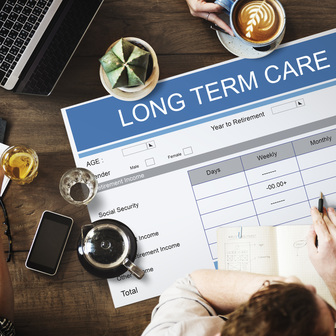
Everybody has known a family that has ended up financially devastated because of a lengthy illness of a family member. The only legacy that their heirs inherit is the medical bills of family members. This tragic outcome can be avoided by having adequate Long-Term Care coverage. Often it is only the family members of someone who has been seriously ill who understand the real importance of having Long-Term Care insurance.
Long-Term Care insurance provides payments for expenses that are not covered by Medicare or for people who don’t qualify for Medicaid. Home Health Care and Adult Day Care are a few examples of some covered benefits that Long-Term Care insurance can offer. The coverage takes effect when covered individuals are unable to perform specified activities (ADL’s). These include bathing, eating, continence, dressing, toileting and transferring.It will also pay benefits if you need supervision due to cognitive impairment such as Alzheimer’s disease or dementia. Medicaid only pays for nursing home care (not in-home care) and only after you have depleted your assets down to the poverty level forcing families to sell property and drastically change their life styles.
65% of all individuals who enter a nursing home sink below poverty line within two years of admission to a nursing home and never had the option of home care.
50% of unmarried couples who enter nursing homes sink below the poverty line within 13 weeks leaving few resources left for them after they have been discharged.
Although married couples are allowed to keep more assets than single people, these assets are subject to recapture by the State after death.
It is estimated that with the advances in medicine, 40% of all baby boomer adults will eventually need Long-Term Health Care.
Long-Term Care insurance provides payments for expenses that are not covered by Medicare or for people who don’t qualify for Medicaid. Home Health Care and Adult Day Care are a few examples of some covered benefits that Long-Term Care insurance can offer. The coverage takes effect when covered individuals are unable to perform specified activities (ADL’s). These include bathing, eating, continence, dressing, toileting and transferring.It will also pay benefits if you need supervision due to cognitive impairment such as Alzheimer’s disease or dementia. Medicaid only pays for nursing home care (not in-home care) and only after you have depleted your assets down to the poverty level forcing families to sell property and drastically change their life styles.
65% of all individuals who enter a nursing home sink below poverty line within two years of admission to a nursing home and never had the option of home care.
50% of unmarried couples who enter nursing homes sink below the poverty line within 13 weeks leaving few resources left for them after they have been discharged.
Although married couples are allowed to keep more assets than single people, these assets are subject to recapture by the State after death.
It is estimated that with the advances in medicine, 40% of all baby boomer adults will eventually need Long-Term Health Care.
Who should consider Long-Term Care insurance?
- People who have accumulated estates and are in the middle or high income brackets.
- People who may have a family history necessitating Long-Term Care.
- Baby Boomers who are retiring within 15 years.
- People who want to preserve assets.
- People who want to stay independent.
